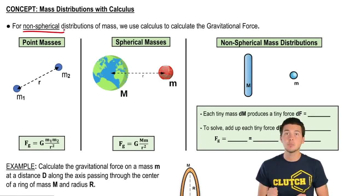8. Centripetal Forces & Gravitation
Mass Distribution with Calculus
Practice this topic
- Multiple Choice
a) Set up the integral for the gravitational force between a rod with a density λ and length 2L, and a mass m at an arbitrary distance D directly above the midpoint of the rod.
b) Evaluate the integral.
608views2rank - Textbook Question
A thin, uniform rod has length L and mass M. A small uniform sphere of mass m is placed a distance x from one end of the rod, along the axis of the rod (Fig. E13.34). Calculate the gravitational potential energy of the rod–sphere system. Take the potential energy to be zero when the rod and sphere are infinitely far apart. Show that your answer reduces to the expected result when x is much larger than L.
496views - Textbook Question
Consider the ringshaped body of Fig. E13.35. A particle with mass m is placed a distance x from the center of the ring, along the line through the center of the ring and perpendicular to its plane. (a) Calculate the gravitational potential energy U of this system. Take the potential energy to be zero when the two objects are far apart. (b) Show that your answer to part (a) reduces to the expected result when x is much larger than the radius a of the ring. (c) Use Fx = -dU/dx to find the magnitude and direction of the force on the particle (see Section 7.4). (d) Show that your answer to part (c) reduces to the expected result when x is much larger than a. (e) What are the values of U and Fx when x = 0? Explain why these results make sense.
424views - Multiple Choice
In the context of mass distribution, how can calculus be used to determine the of an object?
276views - Multiple Choice
If two different objects have different mass distributions described by their respective density functions, would a dozen of each object necessarily have the same total mass?
80views - Multiple Choice
Given three groups of particles located along the x-axis: Group A consists of 5 particles each of mass kg at positions m, m, m, m, and m; Group B consists of 4 particles each of mass kg at positions m, m, m, and m; Group C consists of 6 particles each of mass kg at positions m, m, m, m, m, and m. Which group has the greatest total mass?
109views



